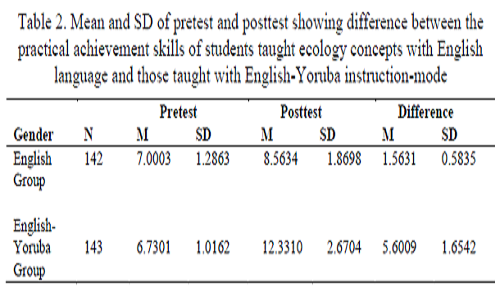
Effect of Bilingual Instruction-Mode on Pre-Service Integrated Science Teachers’ Cognitive and Practical Skill Achievements in Ecology
Abstract
Nigeria is a multilingual country with diverse cultural background. The language (English) used when Nigeria was a British Colony is still the only official language and medium of instruction in the Nigerian schools. The purpose of this study therefore is to investigate the effect of bilingual (English and English-Yoruba) instruction-mode on cognitive achievement and practical skill achievements in ecology among colleges of education integrated science students in Lagos State, Nigeria. A 2x2 pretest posttest nonrandomised quasi-experimental design was adopted for the study. The sample comprised two hundred and eighty-five year two integrated science students from Adeniran Ogunsanya College of Education, Otto/Ijankin, Lagos and Federal College of Education (Technical), Akoka, Lagos. Ecology Cognitive Achievement Test (ECAT) and Ecology Practical Skills Achievement Test (EPSAT) were the two instruments used to collect data for the study. The two research questions and null hypotheses formulated were analysed with mean, standard deviation and t-test at 0.05 alpha level using Statistical Package for Social Science (Version 23.0). Results showed that there is statistical significant effect of the treatment (bilingual instruction-mode) on the cognitive achievement of students in ecology concepts [t(283)=9.583; p<.05]. Mean score of Bilingual teaching strategy is (=12.669) and control group scored the least (=9.683) in achievement in Ecology. Study finding also revealed statistical significant effect of the treatment on the practical skills achievement of students [t(283)=13.917; p<.05]. The study, therefore recommends, inter-alia, that integrated science teachers should utilize bilingual approach to support teaching of integrated science in Nigeria tertiary institutions to enhance students’ academic performance.
Keywords
Full Text:
PDFReferences
Ajewole, G.A. (2016). History and Philosophy of Science and Science Teaching. Lagos:
Print City.
Akinsanmi, G. (2018, February 12). LASG: Yoruba now mandatory for admission into
Tertiary institutions in Lagos. Thisday Newspaper. Retrieved from https://www.pressreader.com/nigeria/thisday.
Zakharia Z. (2017). Bilingual Education in the Middle East and North Africa. In O. García,
A. Lin & S. May (Eds.), Bilingual and Multilingual Education. Encyclopaedia of Language and Education (3rd ed.). Springer, Cham. https://doi.org/10.1007/978-3-319-02258-1_21
Benson, C. (2004). The importance of mother tongue-based schooling for educational quality.
Background paper prepared for the Education for All Global Monitoring Report 2005,
The Quality Imperative. Retrieved from unesdoc.unesco.org
Danmole, B.T. & Lameed, S. N. (2014). Exploring Annotated Drawing for Improving Nigerian Secondary School Students Achievement in Genetics. International Journal of Biology Education, 3(1), 1-11.
Emenanjo, E.N. (1998). Languages and the national policy on education: implications and
prospects. Fafunwa Foundation Internet Journal of Education Languages and the National Policy on Education. Second Foundation Annual Lecture
Evans, L.M. & Avila, A. (2016). Enhancing Science Learning through Dynamic Bilingual
Practices. Childhood Education, 92 (4), 290-297.
Fafunwa, A.B. & Fasokun, T.O. (2000). Aliyu Babatunde Fafunwa. UNESCO:
International Bureau of Education. Retrieved from www.ibe.unesco.org>files>fafunwae.
Federal Government of Nigeria (2013). National Policy on Education. Lagos: NERDC.
Federal Government of Nigeria (1999). Constitution of the Federal Republic of Nigeria.
Igboanusi, H. (2008). Mother Tongue-Based Bilingual Education in Nigeria: Attitudes and
Practice. International Journal of Bilingual Education and Bilingualism, 11 (6), 721-734.
John, K. & Sheil, A. T. (2010).The value of bilingualism in pupils' understanding of
scientific language. International Journal of Science Education, 21, 10, 1037-1050.
Lagos State Government (2018, February, 27). The Lagos Yoruba Preservation and
Promotion Law. Daily Independent. Retrieved from https://independent.ng/lagos-yoruba preservation-promotion-law.
Najat, A. & Muttalib, M. J. (2021). Bilingual education: Features and advantages. Journal of
Language Teaching and Research, 12(5), 735-740. DOI: http://dx.doi.org/10.17507/jltr.1205.1
National Commission for Colleges of Education, NCCE (2020). Minimum standard for
Nigeria Certificate in Education, (2012 Edition). Abuja: NCCE.
Olatunji, O. (2017, November, 22). The bill mandating the use of mother tongue in the
Lagos State education system. Thisday Newspaper. Retrieved from https://www.pressreader.com/nigeria/thisday.
Oluniyi, A. & Akinyeye, B. (2013). Curriculum development in Nigeria: Historical
perspectives. Journal of Educational and Social Research, 3 (1), 73-80. Retrieved from http://citeseerx.ist.psu.ed.
Pennycook, A. (1994). The Cultural Politics of English as an International Language.
London: Longman.
Smith, S.W. (2012). Teaching language and content: Instructor strategies in a bilingual
science class at a Chinese University. International Journal of Higher Education
(2), 92-102. Retrieved from www.sciedu.ca/ijhe.
Ünsal, Z. (2017). Bilingual students’ learning in science: Language, gestures and physical
artefacts. Academic the Degree of Dissertation for Doctor of Philosophy in Science Education, Stockholm University, Svante Arrhenius. Retrieved from www.sida.se.
Zakharia Z. (2017). Bilingual Education in the Middle East and North Africa. In O. García,
A. Lin & S. May (Eds.), Bilingual and Multilingual Education. Encyclopaedia of Language and Education (3rd ed.). Springer, Cham. https://doi.org/10.1007/978-3-319-02258-1_21
DOI: http://dx.doi.org/10.31258/jes.7.2.p.122-133
Refbacks
- There are currently no refbacks.
Copyright (c) 2023 Saibu Sakibu Olajide

This work is licensed under a Creative Commons Attribution 4.0 International License.
Publisher: FKIP Universitas Riau












